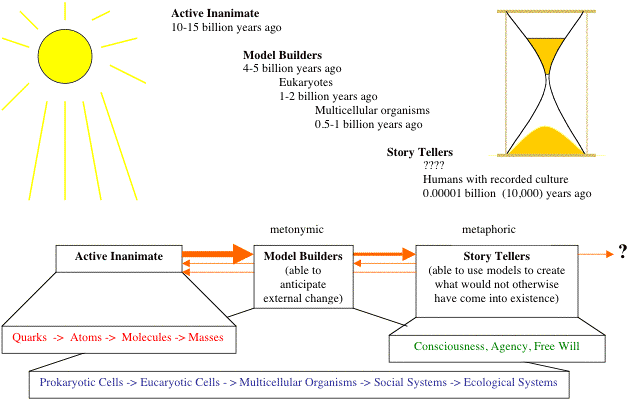
Each part of a developing organism acquires information about other parts; many, in addition, gather information from the external environment. Similarly, each component of a brain gathers information from other parts, some of which are as well collecting information from the environment. Such information-gathering is a fundamental part of both morphogenesis and brain function, not an occasional add-on feature. It is important as well to distinguish such processes from 'reacting' with its accompanying implication that the system returns to status quo: both systems have the characteristic that changes in the external environment lead to more or less permanent (and more or less obvious) changes in internal state. It is this characteristic that warrants the term 'information-gathering'.
This perspective not only provides an intriguing explanation for similarities between morphogenesis and brain function which are otherwise difficult to understand, but suggests some future lines of exploration which may be productive for understanding not only morphogenesis and brain function but biological organization generally. The perspective implies that important aspects of both morphogenesis and brain function (and probably evolution and the immune system as well) are determined not by anything idiosyncratic to these particular systems but rather by some more general set of rules and principles to which they are all subject (see Kauffman (23) for a related exploration). Given the present discussion, the likelihood is that these are rules and principles which govern information acquisition, transmission, and storage in what ever context it occurs. This notion is neither so spiritual nor so far-fetched as it might sound. Shannon established that information is a fully definable and quantifiable commodity, and Wiener's cybernetics has had a salutory impact on studies of both morphogenesis (41) and brain function (5). What has to my knowledge not, however, developed is a general theory of information in a form appropriate for biological systems (see Lloyd and Pagels (27) for what may prove a useful start in physics).
A biologically based information theory would require a way of quantifying information which reflects not only the improbability of a given state but also the degree of significance it has for the receiver: in biological systems the information conveyed by some polypeptide chains is clearly higher than that of others, even if they consist of the same number of amino acids. Similarly, a biologically useful information theory probably ought to include some factor related to the significance of the information content for the possessor; some organizations of molecules yield acceptable development or brain function, while other organizations of the same elements do not. Finally, such a theory would require a definition of information which is compatible with the idea of information addition in going between levels of organization, as discussed earlier in this essay, and perhaps a definition which is independent of a known catalogue of possible states, since it is uncertain whether such a catalogue is a priori enumerable for biological systems.
Evolution in the context of the first and second laws of thermodynamics
from Emerging Emergence, 2004
see also Life, Death, and the Cycle of Emergence, 2003

Issues:
Boltzmann/Shannon: Entropy is missing information
Nice ...
But ...
Widespread Problem (see Information, Hans Christian von Baeyer, 2004)
Information
An example (from Tamara)
Implications
Future needed additions ...
Home
| Calendar | About
| Getting Involved
| Groups | Initiatives | Bryn Mawr Home | Serendip Home
Director: Liz McCormack -
emccorma@brynmawr.edu
| Faculty Steering Committee
| Secretary: Lisa Kolonay
© 1994-
, by Center for Science in Society, Bryn Mawr College and Serendip
Last Modified:
Wednesday, 02-May-2018 10:51:19 CDT